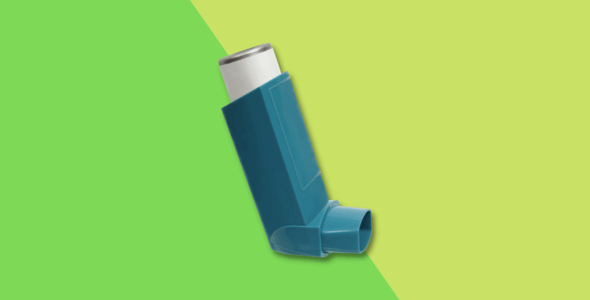Advair side effects and how to avoid them
Table of contents
Advair is an FDA-approved brand-name medication manufactured by GSK (GlaxoSmithKline). It contains an anti-inflammatory medicine (fluticasone propionate) and a long-acting bronchodilator (salmeterol). It is used to prevent asthma attacks and flare-ups or worsening of chronic obstructive pulmonary disease (COPD) associated with chronic bronchitis or emphysema. While Advair is generally well tolerated, there are some potential side effects that people should be aware of. The most common side effects of Advair include sore throats and oral thrush. Less common but more serious side effects can include serious allergic reactions.
Learn more about the side effects of Advair and what you can do to avoid them.
What is Advair (fluticasone/salmeterol)?
Advair is a prescription medication used to prevent the symptoms of asthma in adults and children 12 years of age and older. Advair contains the fluticasone propionate/salmeterol combination. When inhaled, these ingredients work together to open up your lungs and airways. Fluticasone propionate is a type of corticosteroid. When you inhale Advair, molecules of fluticasone propionate attach to areas on the surface of the cells in your airways and lungs called glucocorticoid receptors. This stimulates the receptors, making them produce lower amounts of the substances that trigger inflammation and greater amounts of anti-inflammatory proteins. This helps to reduce inflammation throughout your lungs and airways.
Salmeterol is a medication called a long-acting beta 2-adrenergic agonist (LABA). It attaches to areas on the outside of muscle tissue in your airways and lungs called beta-2 receptors. This stimulates the receptors, causing them to relax the muscle tissue, opening up your lungs and airways.
What are the most common side effects of Advair?
The most common side effects of Advair in clinical trials include the following:
- Headaches
- Dizziness
- Nausea, vomiting
- Sore throat
- Throat irritation
- Hoarseness and changes to your voice
- An increase in upper respiratory chest infections
More serious side effects of Advair include
- A weakened immune system, making you more vulnerable to infections, including serious infections like tuberculosis
- Adrenal insufficiency
- Life-threatening allergic reactions to the medication cause hives, and swelling in your face, mouth, and throat, which can make it difficult to breathe
- A sudden worsening of your asthma symptoms, including asthma attacks (paradoxical bronchospasm)
- Fungal infections (candida/thrush) in your mouth and throat – this is less likely if you rinse your mouth out with water after taking your Advair Diskus
- Increased blood pressure
- A fast and/or irregular heartbeat
- A thinning and weakening of bones (osteoporosis)
- An increased risk of eye problems, including glaucoma, cataracts, and blurred vision
- An increased risk of developing pneumonia if you also have chronic obstructive pulmonary disease (COPD)
- Slowed rates of growth in children
These aren’t all the possible side effects Advair can cause. You can find more details in the patient leaflet that comes with your medication. If you have any concerns about side effects, talk to your physician or pharmacist. You are encouraged to report the negative side effects of prescription drugs to the FDA. Visit www.fda.gov/medwatch, or call 1-800-FDA-1088.
What are the immediate side effects of Advair?
The more immediate side effects of Advair include dizziness, headaches, throat irritation, nausea, vomiting, coughing, oral thrush, muscle pain, or upper respiratory infections.
Does Advair have long-term effects?
Advair contains an inhaled corticosteroid, fluticasone, which can cause long-term side effects such as slow growth rate in children, the development of cataracts and glaucoma, weakening of bones, increasing the risk of fractures and osteoporosis, and reducing the function of adrenal glands.
Does Advair affect teeth?
Advair may affect tooth and gum care as it may increase your risk of dental decay and mouth sores, especially in children.
Does Advair cause anxiety?
Anxiety has been reported in rare cases with Advair HFA since the drug became available for use.
Does Advair cause weight gain?
Advair may cause weight gain in 1% to 3% of people who use Advair HFA. Speak to your doctor if you are concerned about weight gain as a side effect of Advair.
Does Advair affect heart rate?
Salmeterol may increase heart rate in some patients. Speak to your doctor if you experience this side effect.
What does Advair do to your lungs?
Advair helps to relieve symptoms such as coughing, wheezing, difficulty breathing, and shortness of breath by relaxing the airways in your lungs.
Advair dosage
Advair Diskus is available in an oral inhalation powder in the following doses: Fluticasone propionate (100, 250, or 500 mcg) and salmeterol (50 mcg) as an oral inhalation powder.
Advair HFA inhalation aerosol is available as 45 mcg fluticasone propionate/21 mcg salmeterol per actuation, 115 mcg fluticasone propionate/21 mcg salmeterol per actuation, and 230 mcg fluticasone propionate/21 mcg salmeterol per actuation.
Advair Diskus and Advair HFA are both used twice a day. The recommended starting dose is based on the severity of your asthma. Please read the prescribing information and drug information and always speak with your healthcare provider about any changes to your dose so they can monitor and evaluate your condition.
How long does it take for Advair to take effect?
Advair may take up to a week before you see its full effects. Speak to your doctor if your condition becomes worse or does not improve.
Advair drug interactions
Advair can interact with other medications, including:
- Any other medications taken to treat asthma or other breathing problems
- Any other medications that contain steroids
- Any other medications that contain a long-acting beta agonist (LABA)
- Any medications taken for the treatment of water retention such as diuretics
- MAOi inhibitors
- Antidepressants
- Any medications taken to treat bacterial, viral, or fungal infections, including an HIV infection, such as ketoconazole, itraconazole, ritonavir, nelfinavir, or cobicistat
Advair can interact with other medications. This can change how Advair Diskus and other medications work and can make side effects more likely. Tell your prescribing physician about all your drugs, including vitamins and dietary supplements.
Advair warnings & precautions
You should not use Advair if you:
- Are allergic to the active ingredients fluticasone, salmeterol, or milk proteins
- Have had a serious allergic reaction to any of the other ingredients in Advair
- Have sudden breathing problems, like an asthma attack. Use a rescue inhaler to treat sudden breathing problems
- Are under 12 years of age
Talk to your doctor before using Advair if you:
- Are taking any of the medications that could interact with Advair
- Have any problems with your immune system
- Have any liver problems
- Have any heart problems
- Have diabetes
- Have osteoporosis
- Have high blood pressure
- Have any thyroid problems
- Have any eye problems, including cataracts or glaucoma
- Have or have ever had any problems with your adrenal glands
- Have an active infection
- Have recently been around someone who has measles or chickenpox
- Have or have ever had a seizure
- Are pregnant or are planning to become pregnant
- Are breastfeeding or are planning to breastfeed
You should always check with your doctor or pharmacist before taking any medication, including Advair, to make sure it is safe for you.
Is it possible to overdose on Advair?
Yes. Overdosing may lead to symptoms such as chest pain, fast or irregular heartbeat, shakiness, feeling weak, nausea, vomiting, headaches, and seizures.
Is it safe to drink alcohol when using Advair?
Alcohol is safe to consume in moderation when using Advair. Avoid smoking, however, as this will make your symptoms worse and your treatment less effective.
How to avoid Advair side effects
The best way to avoid side effects is to take Advair as directed by your doctor. Follow your doctor’s instructions carefully, and do not take more or less than prescribed.
If you experience any side effects, talk to your doctor or pharmacist. They may be able to recommend ways to help reduce or prevent some of the side effects.
1. Stick to the recommended dosage
Take your prescribed dose of Advair that has been recommended by your healthcare professional. Do not take more or less than prescribed.
2. Monitor your blood sugar levels
If you have diabetes, it is important to monitor your blood sugar levels closely while taking Advair. Check your blood sugar levels as directed by your doctor and report any changes to your doctor immediately.
3. Drink plenty of fluids
Drink eight to 10 glasses of water or fluids every day to help prevent dehydration, which can make side effects worse.
4. Don’t skip meals
Eating regular meals and snacks will help to prevent low blood sugar levels (hypoglycemia).
5. Check your feet
If you have diabetes, check your feet regularly for any cuts, sores, or redness. Tell your doctor if you experience any problems with your feet while taking Advair.
6. Know the signs and symptoms of Advair side effects
Signs and symptoms of side effects include sore throats and oral thrush. If you experience any of these symptoms, speak to your doctor for medical advice.
7. Monitor your weight
Advair may cause weight gain. If you experience this side effect while taking Advair, get medical advice from your doctor.
8. Tell your doctor about all medications you’re taking
Be sure to tell your doctor about all other medications you’re taking, including over-the-counter drugs, vitamins, and herbal supplements, as they can interact with Advair.
9. Get regular medical check ups
It is important to get regular medical check ups and monitor your medical conditions. Your doctor will monitor your side effects and may adjust your dose of Advair as needed.
Medically reviewed
A medical professional has reviewed this article.


Jamie Winn, PharmD
Jamie Winn, PharmD
Dr. Jamie Winn received his Doctor of Pharmacy in 2002 from the University of South Carolina College of Pharmacy, Columbia, SC. Jamie is a medical reviewer for NiceRx.






